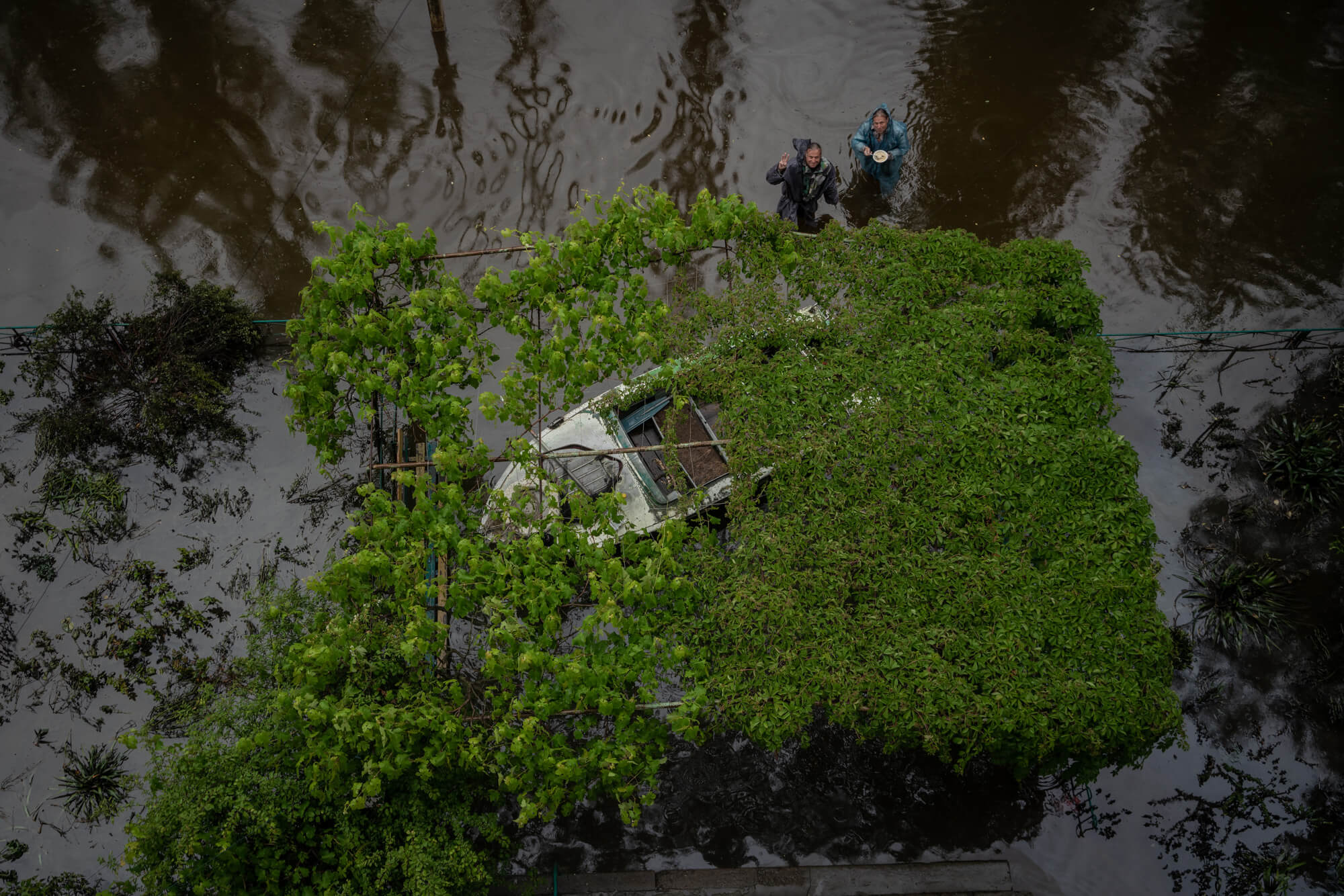
There Used to be Land Here
You forget what you want to remember,
and you remember what you want to forget.
Cormac McCarthy (20.07.1933 — 13.06.2023)
On the sixth day after the Russians destroyed the Kakhovka Dam in Kherson, rain pours, obscuring visibility. Gone are the familiar sights of car tracks, fields where cows once grazed, and the hum of yards and football fields. Now, water is everywhere.
An obscure shape approaches from afar, blending shades of gray and blue. Gradually sharpening into focus, it reveals figures of the twins, Borys and Yuriy Knyazhynski. Tall with long gray hair, the brothers have been rescuing humans and animals since the day the dam was blown up.
Time and again, the duo refuels their vessel, the «Drakar», before venturing into uncharted territories like Vikings. New unfamiliar routes lie ahead, unknown danger concealed beneath the depths of the water. Just as unknown is the damage caused to humans and nature — no one knows how this situation will unfold in the days to come.
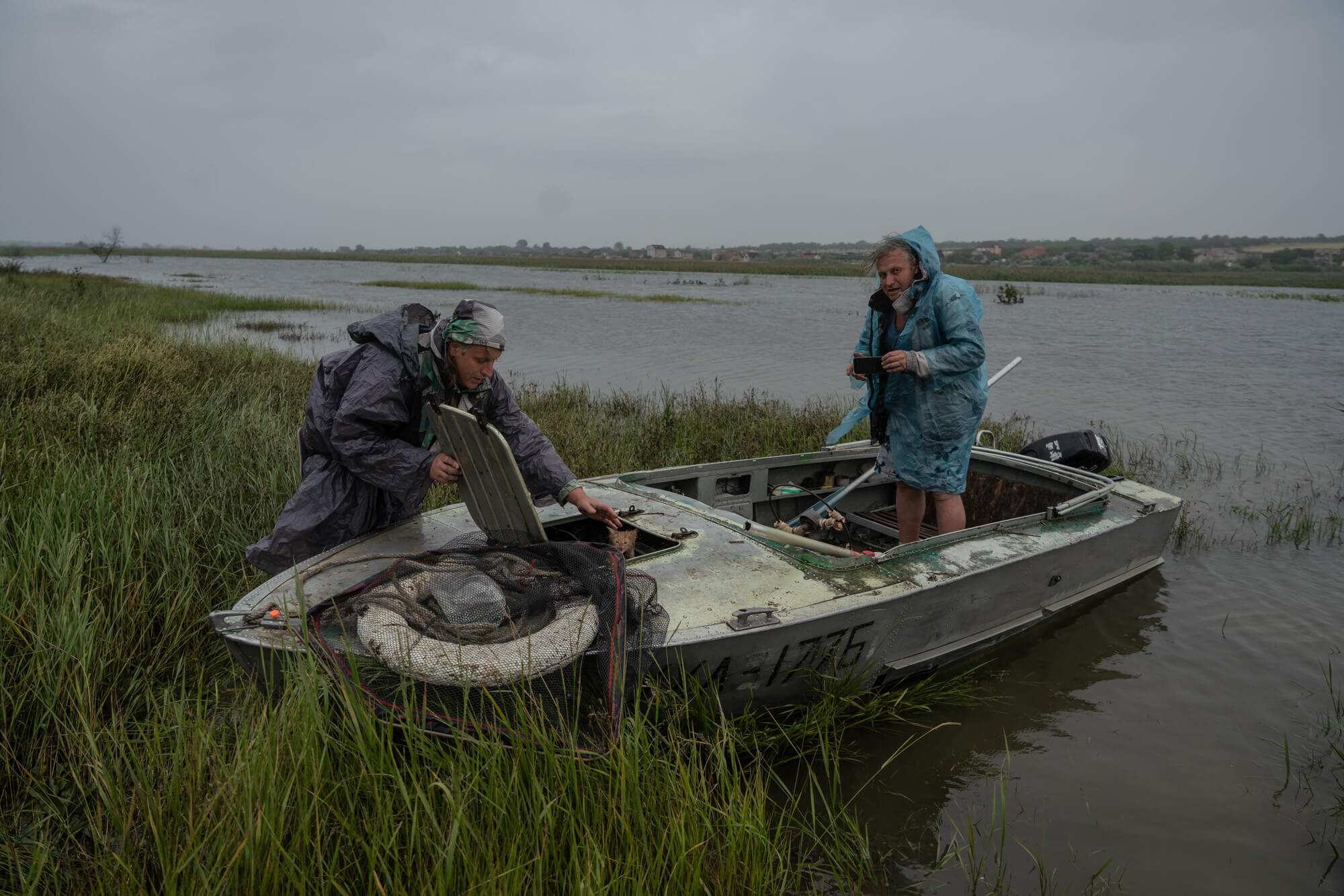
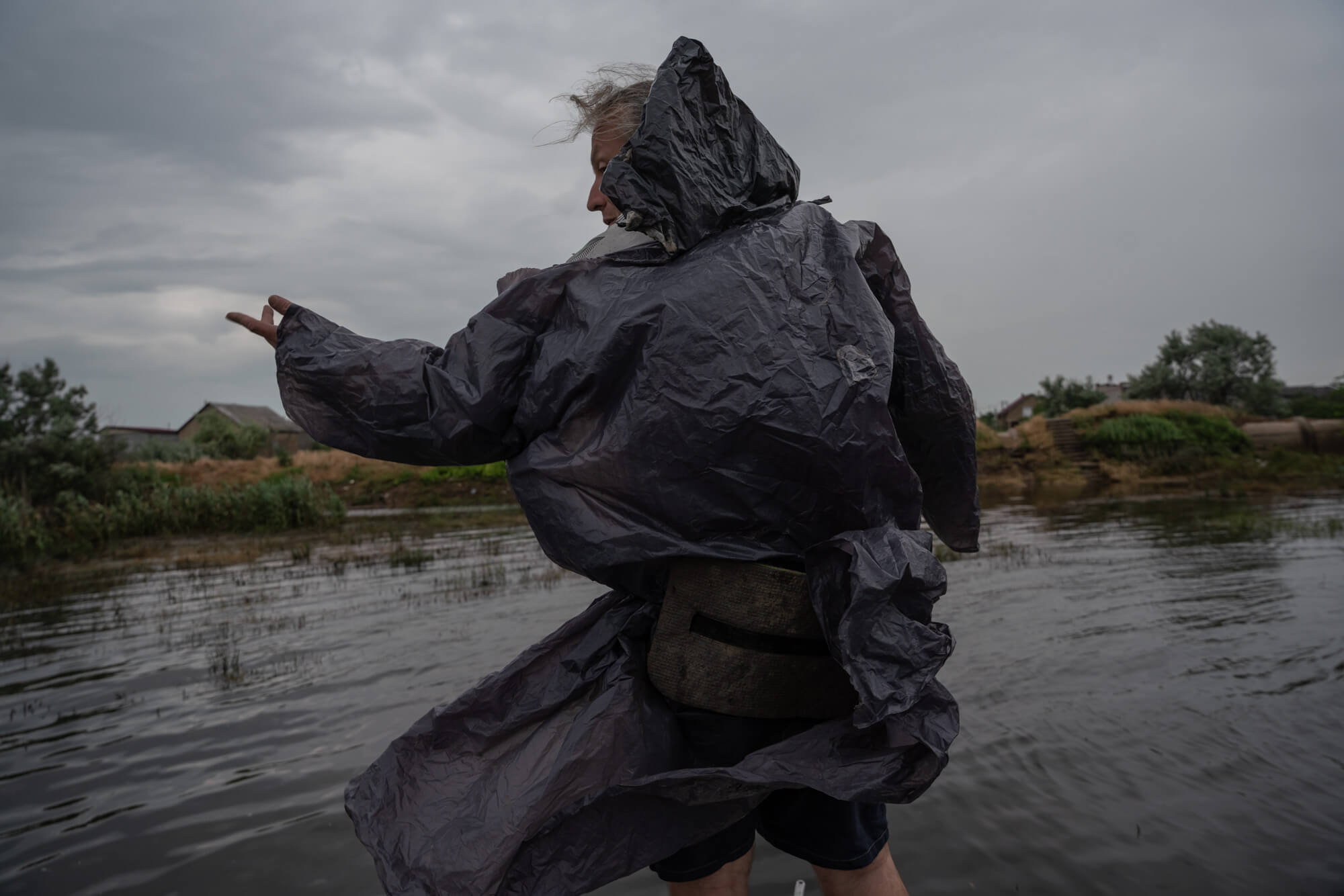
Twins
When the waters rose, the ship belonging to the Kniazhynski brothers was caught by the wave. One of the brothers plunged into the depths, swimming for several kilometers, refusing to let their vessel succumb to the onslaught. He claims that he could traverse Dnipro even with his hands and feet bound. The twins listen to Norwegian hard rock and have had long hair since childhood. Yuriy stands tall, clutching an oar, while Borys tends to the vessel, pouring gasoline into the tank.
Amidst the confines of the «Drakar’s» cargo hold, a wail echoes, growing louder. One of the brothers reaches down and retrieves a drenched, frightened red-brown kitten. As the animal tries to break free, he hands the creature to Karen, who just arrived in an ambulance with provisions. A sharp-looking 40-year-old man, Karen hands over several packages of food and a list of addresses. These parcels are intended for the sunken island of Corabel, where they must be delivered to those in need.
— Why don’t those people want to evacuate?
— You ask them.
This is Karen’s fifth ambulance — all the previous ones were burned by the enemy. He came from Simferopol before the full-scale invasion, transporting people under shellfire from the then-occupied Kyiv region, and later from Kherson and the east. Karen places the kitten into an empty box.
His main objective is to evacuate a 78-year-old disabled woman. Isolated on an island, she is unable to walk but has a talent for writing poetry and fortune-telling with cards. Her name is Clarinda Vasylivna, and her mother served as a sniper during the Second World War.
The rain steadily intensifies.
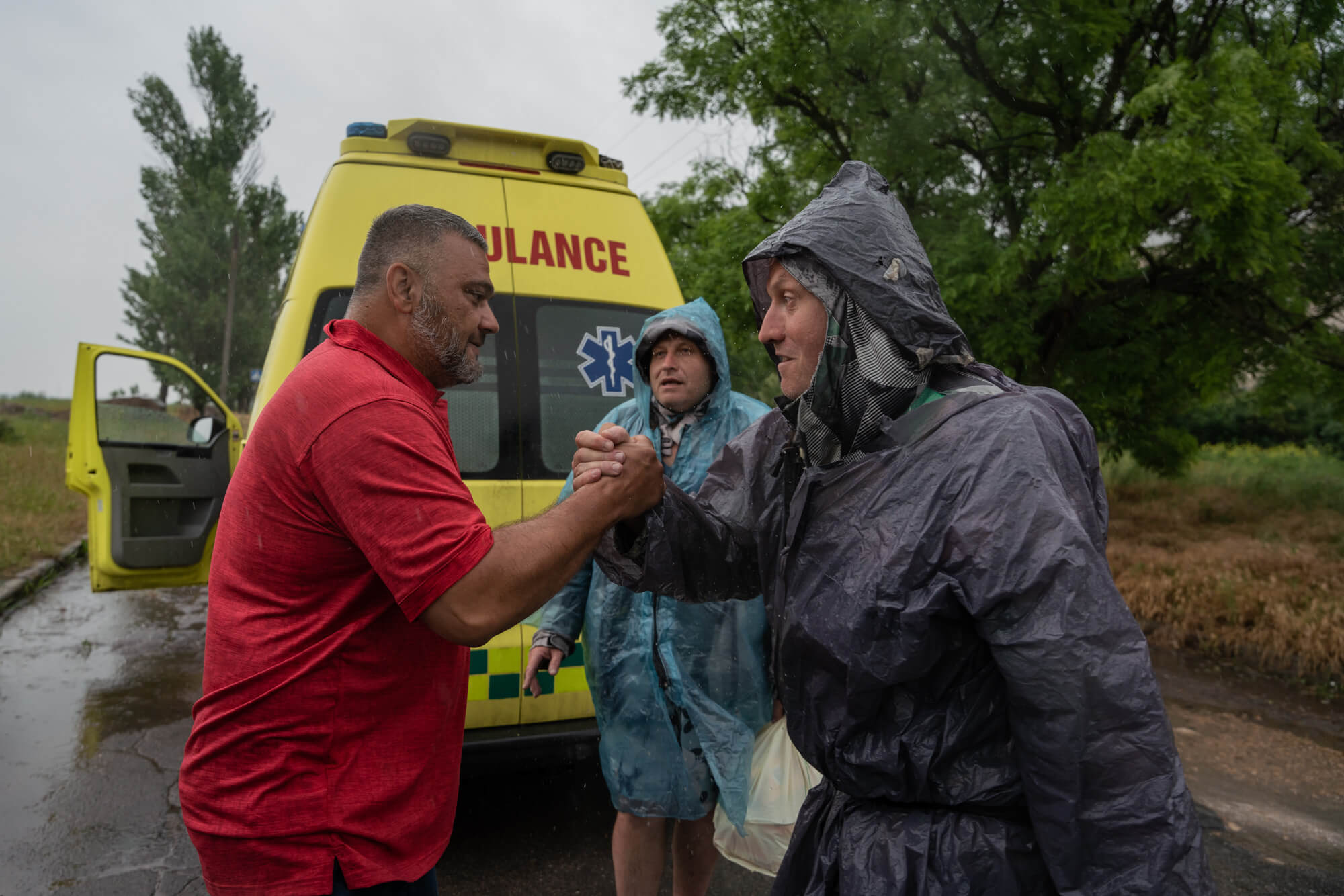
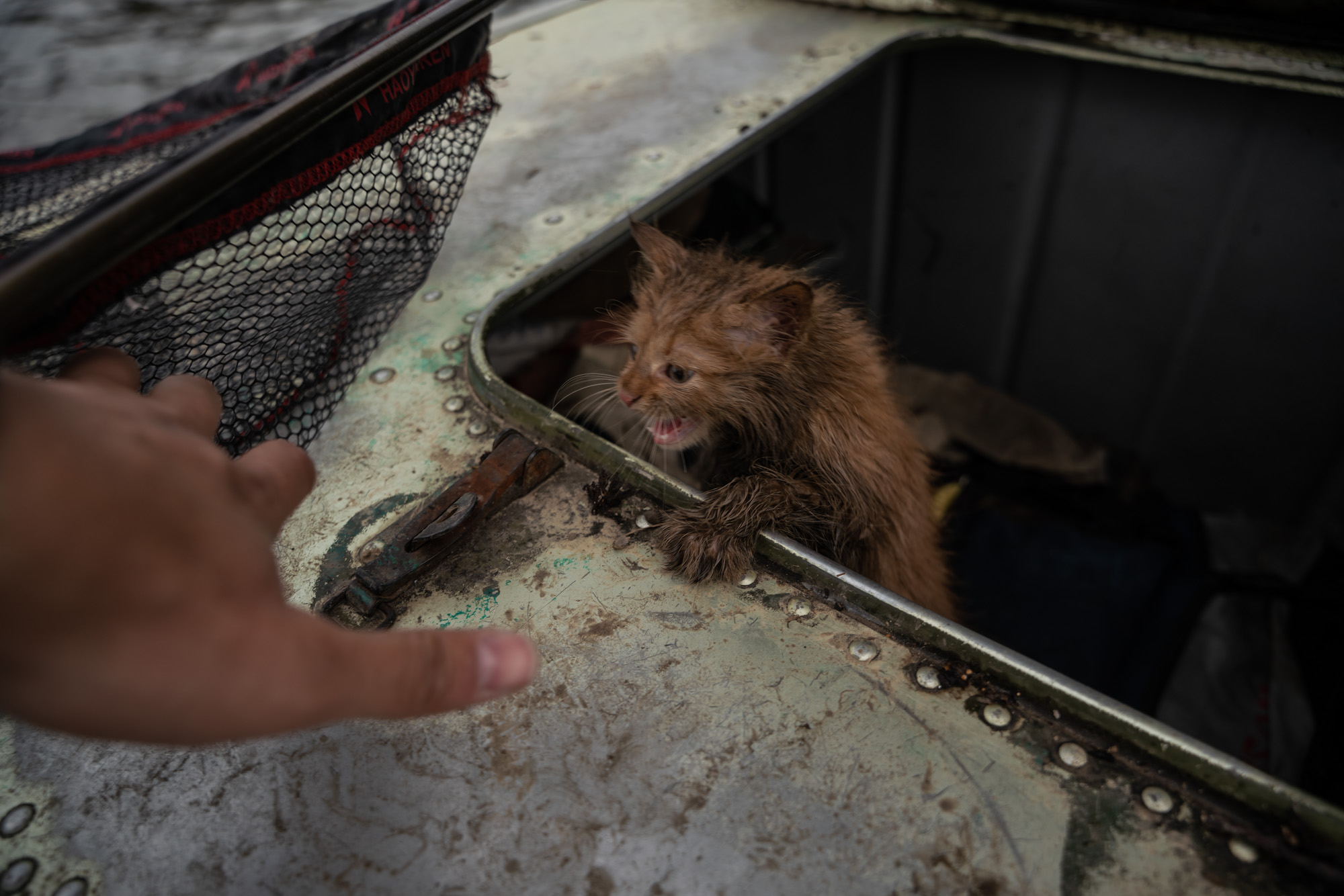
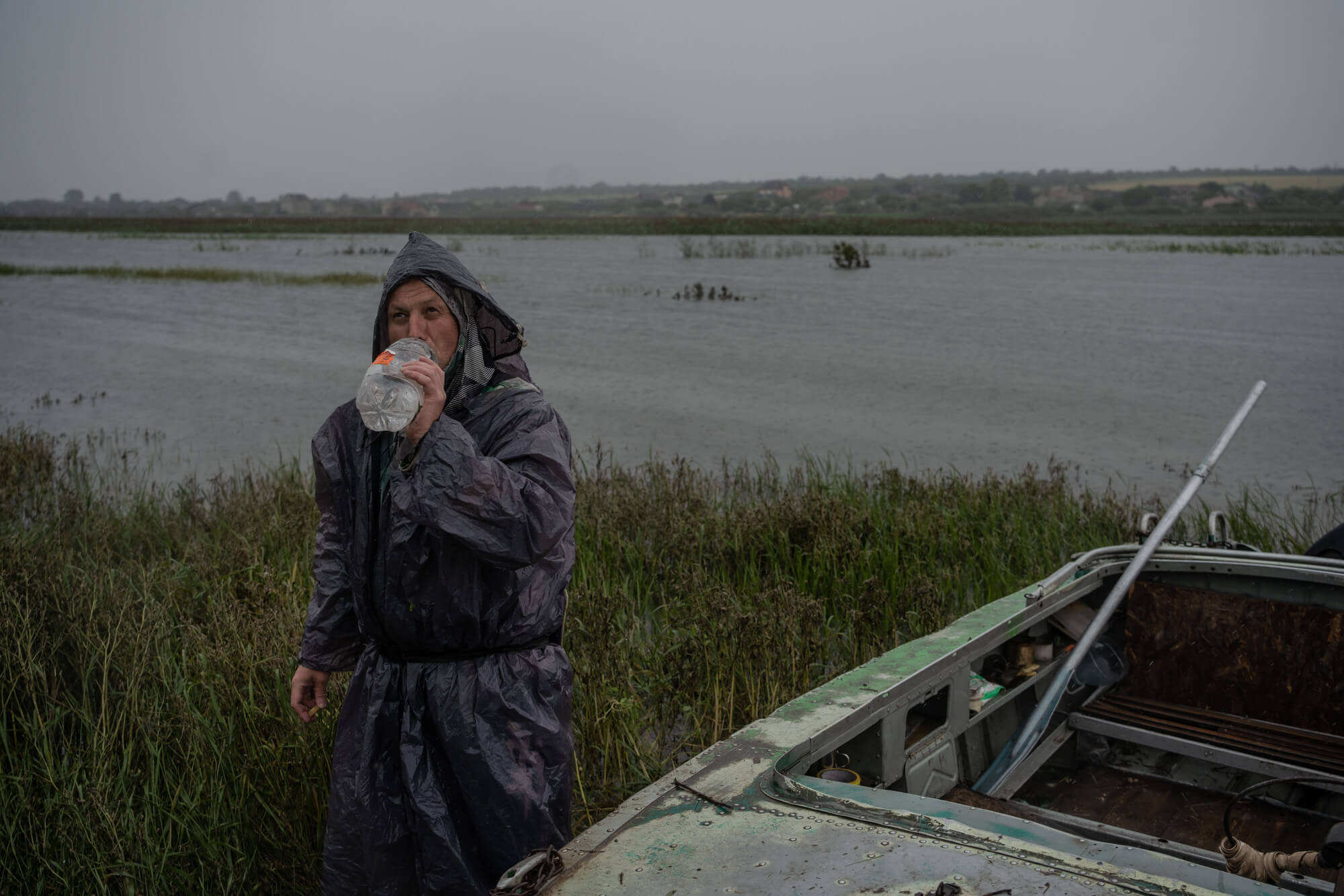
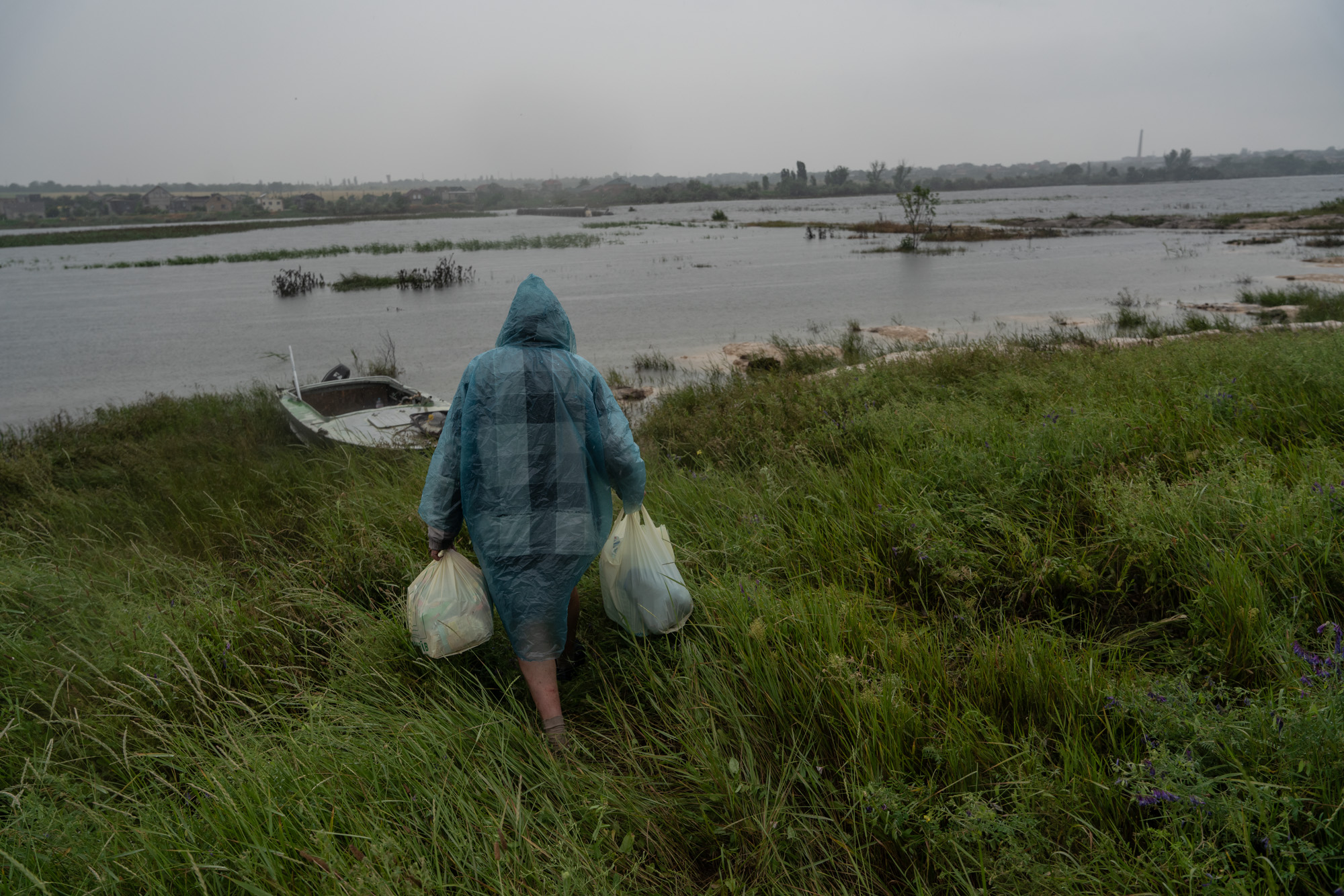
— We’ve spent our entire lives on this river. We know every twist and turn — the brothers say in unison.
— We’vebeen sailing around for days, and everywhere people are shouting: «Drinking water! Drinking water!», showing crutches from their windows.
Yesterday, the brothers crossed paths with a boat carrying two military rescuers. The force of the swift current pulled that boat under a nearby barge, and the men died.
Water
The «Drakar» sets its course towards Corabel Island. Blades of grass protrude from the water’s surface, resembling rigid iron structures. In the distance, a red cloth tied to a tree serves as a landmark. Beyond it lies the highway, its triangular road signs barely visible. The shores of Kherson are littered with damaged boats — evidence of the uncertain waters and an altered riverbed. A patched hole now adorns the «Drakar», a consequence of colliding with a submerged fence.
Karen contacts the brothers by phone, and they tell him they will arrive at the older woman’s location within an hour. They’ve only known Karen for three days. To ensure the old lady’s safety, the brothers hide large hooks with spinners on the pike. On the boat, an array of items are arranged. A mirror, gloves, canned pate, a monocle, scotch tape, soap, and a large net specifically designed for capturing dogs: frightened animals often try to bite the rescuers in a state of panic.
— We have a summer cottage on the island. It must have been washed away. We haven’t looked yet, no time for that. Once things settle down, we’ll go and check it. We used to have apricots, cherries, plums, strawberries, and raspberries there.
Ripe mulberries, grape leaves, and glossy green plums are jutting out from the water’s surface. A pheasant is perched on a floating board. In the distance, two pokers catch one’s eye: one of them sinks – those are ducks.
The rain stops. The sunlight reveals an iridescent film on the surface of the water. The stench spreads across the surface of the water, stinging the nostrils.
— Here it is, a disaster…
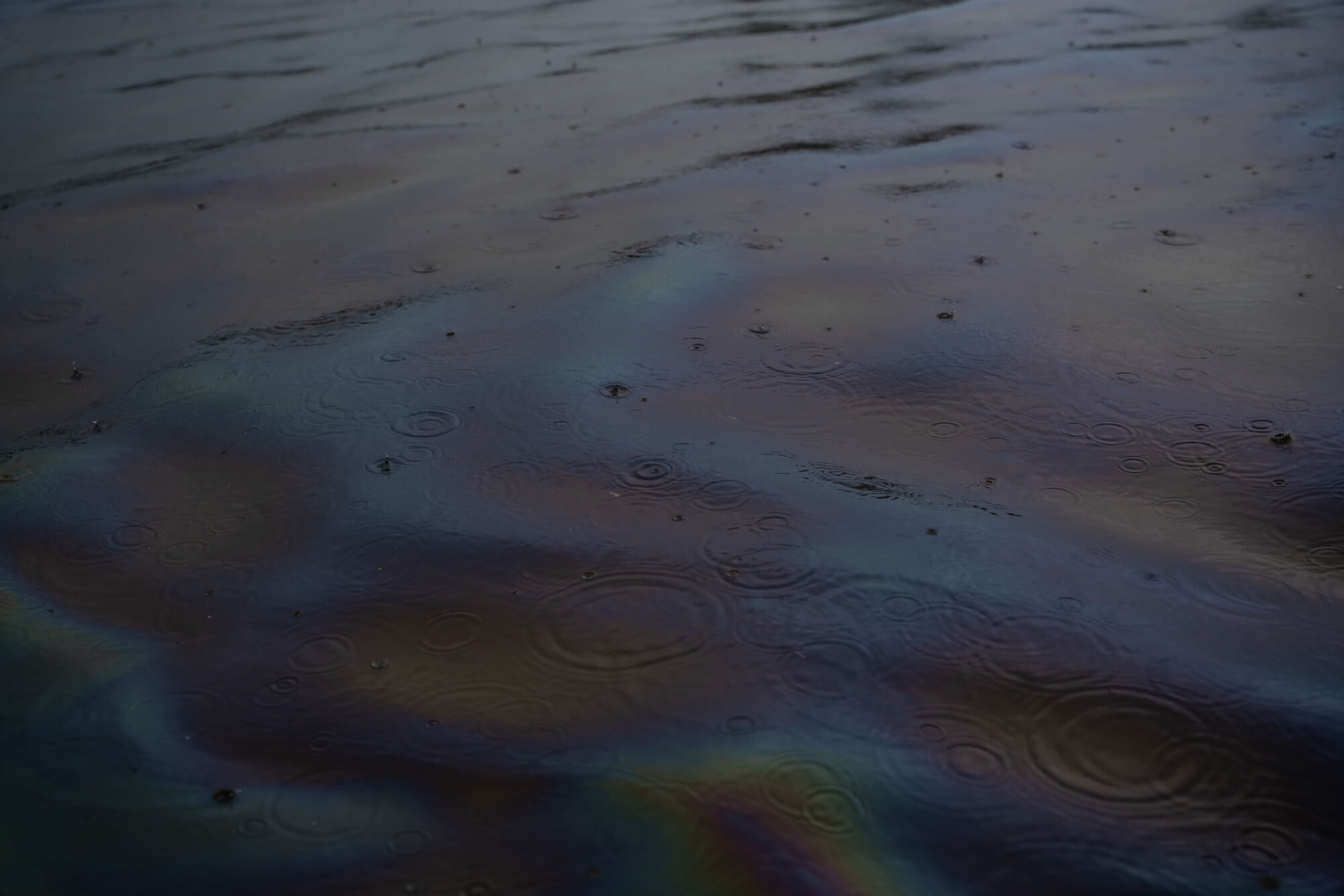
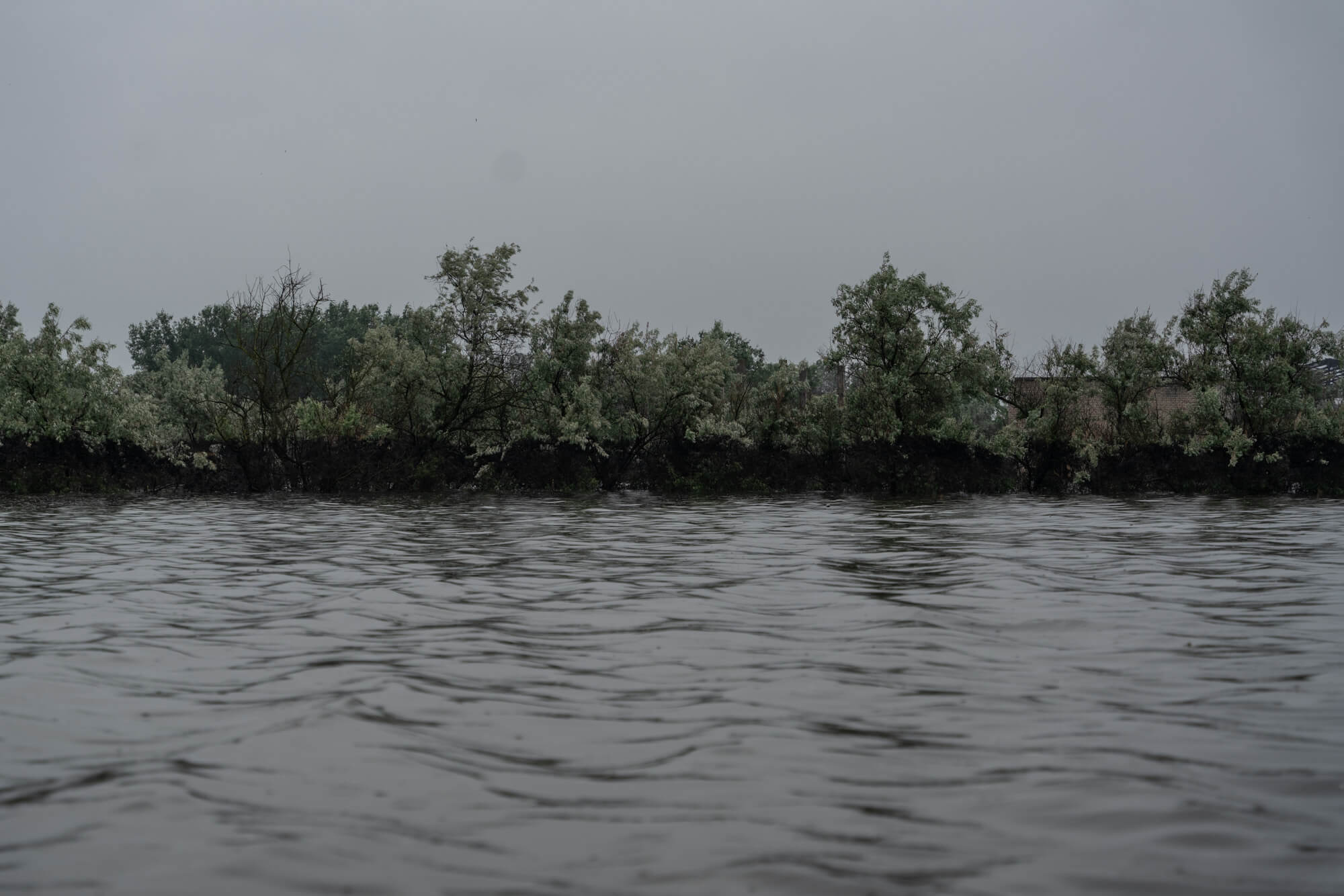
Where the water receded, the tops of the trees are green, while the submerged parts are black and rotten. Roofs, roofs, roofs stretch as far as the eye can see, with one house’s wall collapsed, causing the roof to tilt precariously. Drifting amidst the debris, a car-like object floats by. The brothers are crouching to pass beneath the gas pipes. Above, power grid wires hang like a broken bowstring in the meadow. In the distance, there’s a fallen crane and a flooded bridge. Along the sides, abandoned asphalt and brick factories stand, their operations halted since the city endured intense shelling. Some houses have broken windows and marks of soot from past fires.
— Yesterday we saw a floating mine with horns. A very strong current washed it past us.
Suddenly an impact jolts the boat, hitting the rails of where a railway used to run.
Yesterday, the brothers sailed to reach a yacht entangled among the poplar trees. The owners, a couple, refused to leave the boat, and the twins managed to pull it back into the water. Later, Yura and Borys underwent a four-hour detention by the police, who were investigating their potential involvement as saboteurs. The situation in Kherson is tense. Today, Russians fired at a boat that was evacuating people from the occupied territory. Three people were killed.
The brothers sail slowly to avoid collision with the pipeline from the nearby oil plant. Along their path, there’s a church with a blue roof and a gilded dome, nestled amidst poplar tree alleys. It feels as if they are gliding through the Grand Canal in Venice.
Raindrops become longer, like arrows. The enemy’s artillery is firing. The courtyards have special acoustics: people here are used to guessing the type of weapons, but the water under the windows muddies the sounds.
Fire
The twins make a turn just as they reach the «residential zone» sign. As they venture further, they are greeted by paintings of fairy-tale heroes adorning the entrances to buildings, a sculpture of a child immersed in water, and a an old man, standing at the water’s edge as if guarding the threshold:
— Hello-o-o. Don’t you want to cast the net to catch some shrimp?
— No-o-o.
— Do you have cigarettes?
— We need to evacuate the old lady, we’ll come back to you later.
— Old lady? — He chuckles, revealing a toothless smile. — Bring her over, I’ll be waiting!
The twins change their course, navigating towards a different street. From a distance, a local resident waves energetically.
— Come join us! — He exclaims. — We’ve got piping hot pilaf ready!
They sail into the yard. The bow of the boat bumps into the stairs. On both sides, there are plants with the usual pattern: the lower parts submerged in water, the middle tainted by blackness, and the upper sections vibrant green. A small group of people gathered around a barbecue fire, engaged in conversation.
— Say hello to the great land, — women shout from the second floor.
Yura and Borys disembark from the boat and make their way towards the flooded houses. The majority of the residents here are elderly. Next to the pot, a book by Alexei Tolstoy rests on the grill.
— We used this Russian writer to start the fire, — says Oleg, the man who invited the brothers to try the pilaf.
He reflects on the first two hours following the destruction of the dam, recalling how scary it was. His neighbor chimes in, «We all believed that once the water subsides, everything would be washed away! Yet, for six days, we have been living in this state. Together with our neighbors, we assessed our resources — water, canned goods…».
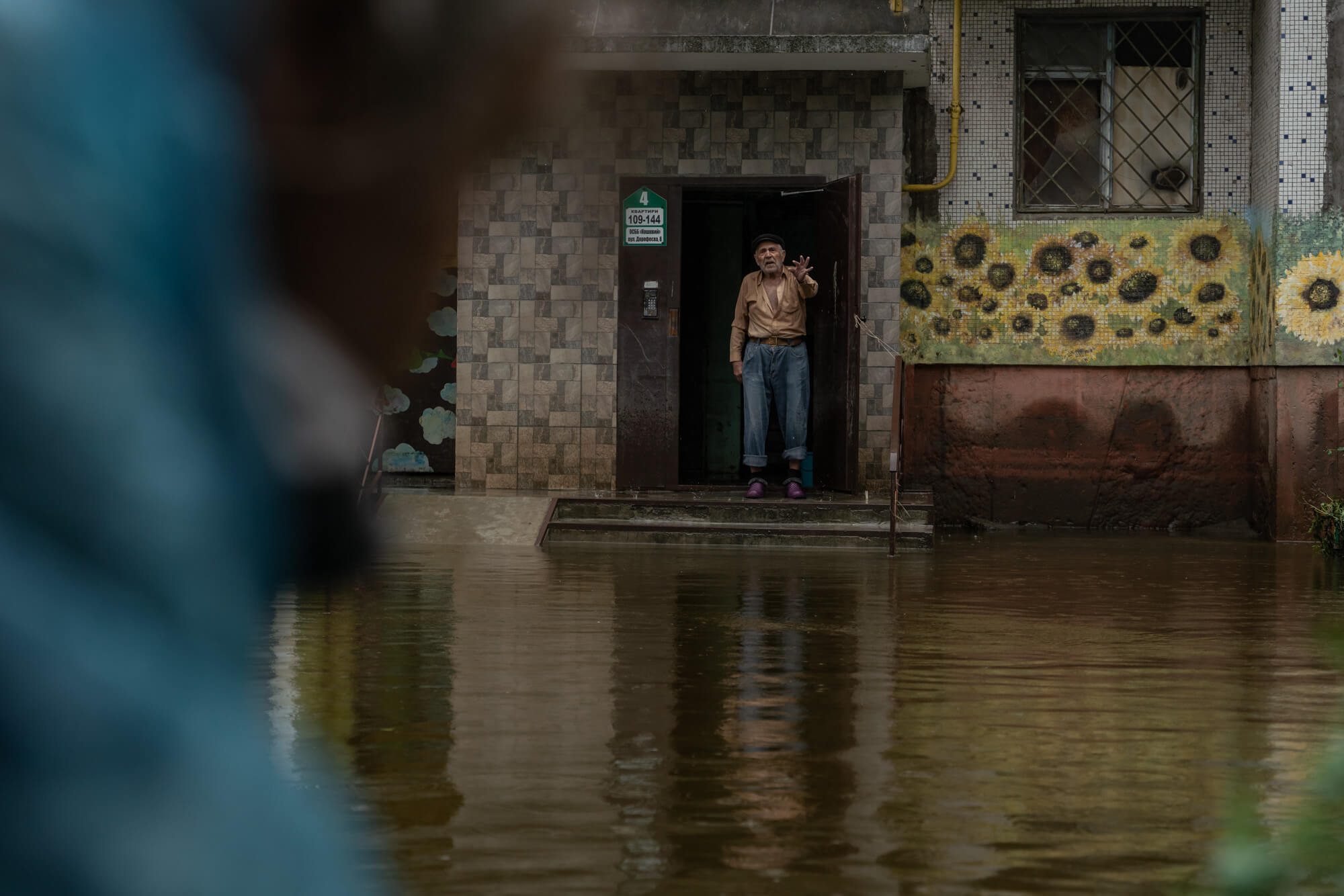
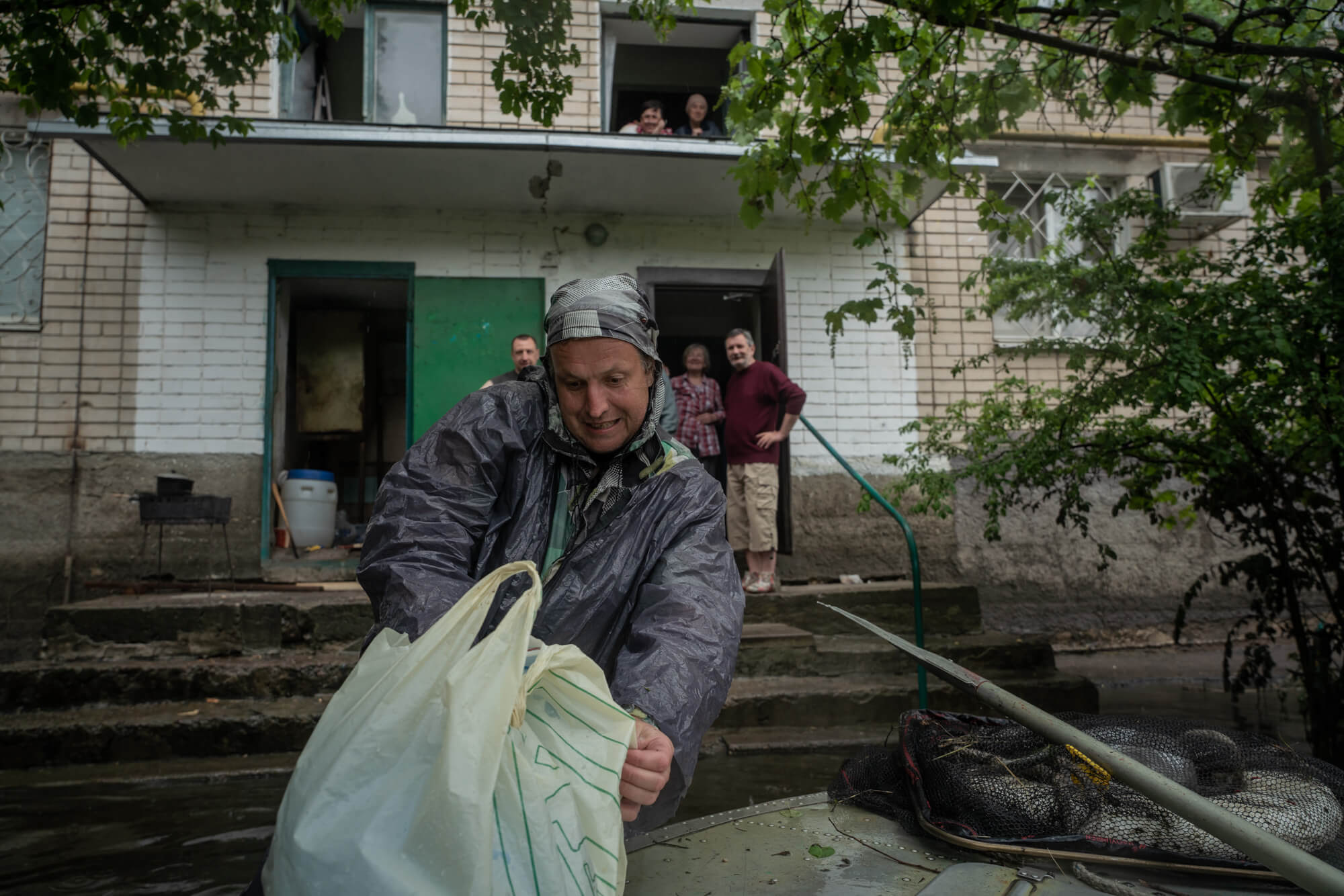
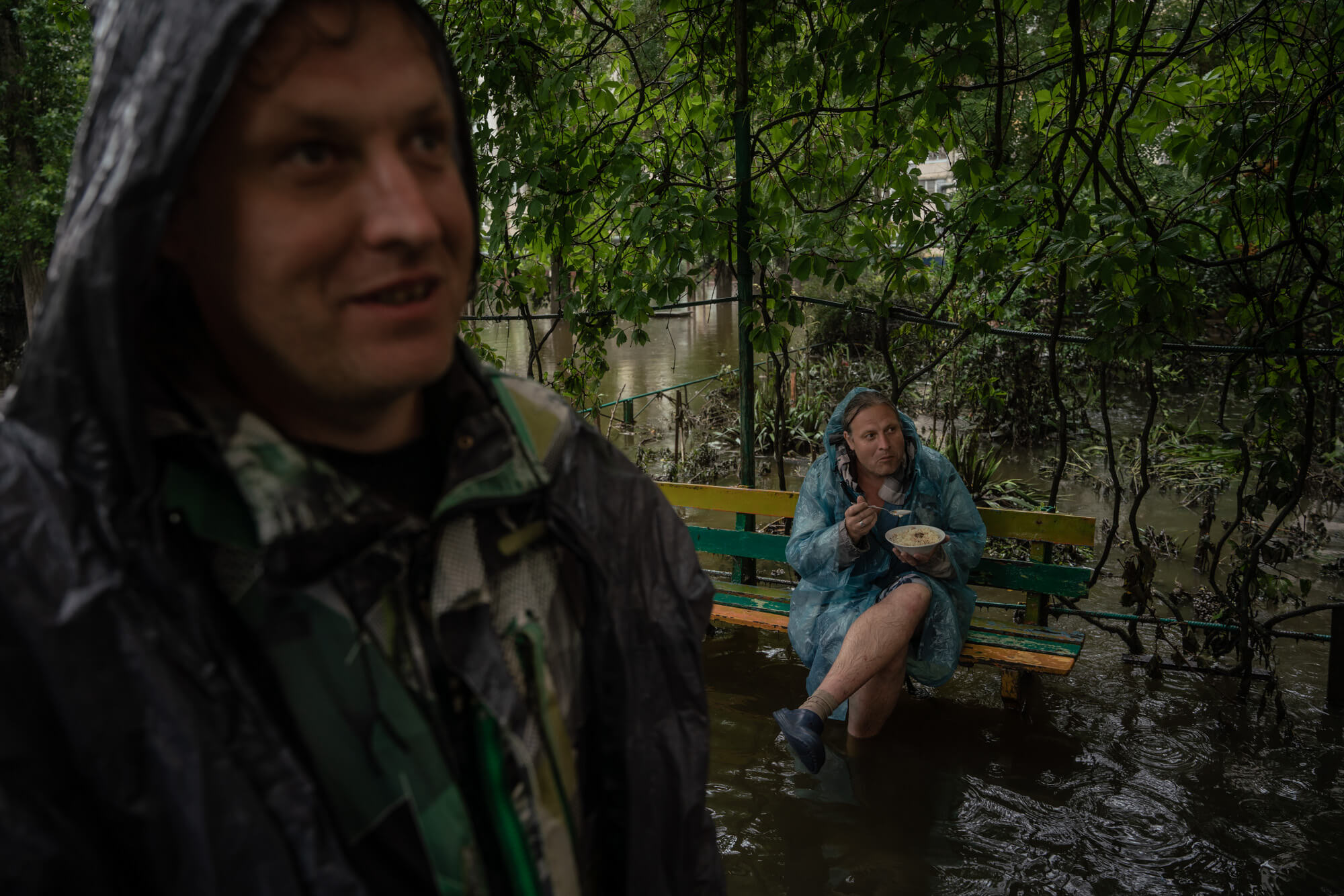
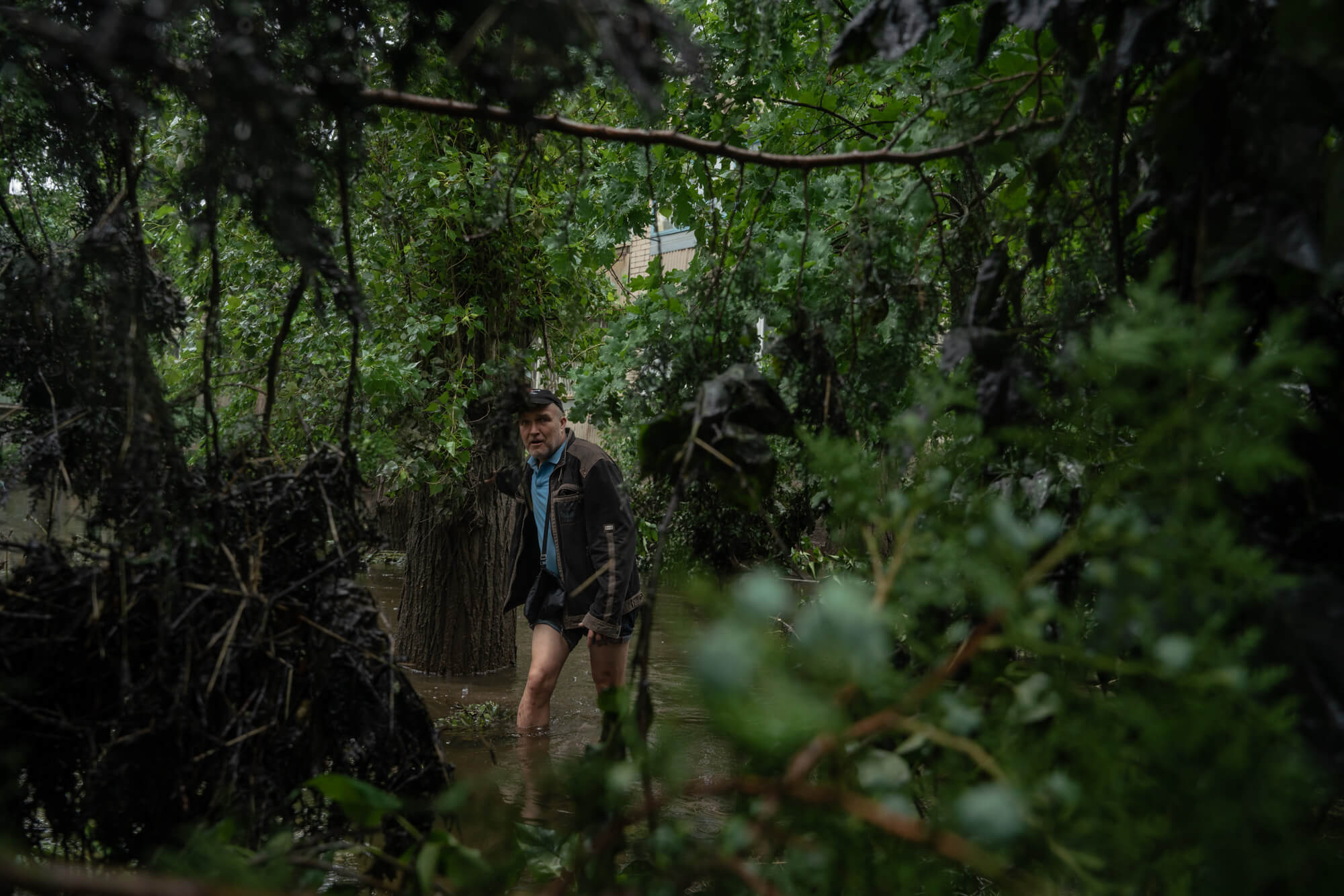
Oleg gathers scattered fragments of old wooden furniture, knowing it will serve as valuable firewood. In case their supply runs out, there are a few dry poplar trees conveniently located across the street, just in front of the football field.
— We have a person here with a chef’s diploma!
Rosy-cheeked Lyudmyla actually works as a cook at the local school:
— We are preparing more food to feed anyone who can reach us by swimming, — she remarks. — Tomorrow we’ll have kulish, and the day after, green borscht.
The pilaf tastes quite good but it could use more onions and carrots. It’s clear that people don’t have enough ingredients.
— How would you rate this pilaf?
— Twenty stars out of ten, — says one of the twins.
He sits on a bench nestled amidst the grapevines, dangling his feet in the water. Eventually, he rises from his seat and reaches out to retrieve some pickles from the jar offered by grey-haired Nina. Valentyna, another resident, guides him to her apartment on the second floor, where she proudly introduces Kesha, her white fluffy cat:
— Kesha is 16 years old today. The whole building already wished her a happy birthday
The residents of the building insist that everyone who comes by should try the pilaf.
— There’s a war raging, and here I am, living out my own version of Robinson Crusoe, — says Lyuda. — You should have seen what happened yesterday! They (Russians) were shelling us, and we were like… — she mimics pointing her middle fingers towards the sky, — tu-tu-tu-tu. It whizzed past us, and we had to guess where it would land… I had a dream before the dam was destroyed… I dreamt of clean water in the well. There wasn’t much of it… It’s a good sign — she breathes heavily. — It’s a good sign, a good one.
«Join us tomorrow for kulish,» — Oleg chuckles.
The boat sets sail towards the old woman in need of evacuation. In the distance, Oleg, Nina, Lyuda, Valya, and three other locals wave goodbye from beneath the shelter of grape leaves.
Clarinda and her catalpa
The side of the boat is sticky — there are oil stains in the water again. A military boat floats in the distance:
“Are you all right?» — yell the men from the boat.
«We’re all right!» — reply the twins.
On another street, the boat encounters a rapid current opposing its movement. Reacting swiftly, the brothers leap out, securing a rope to the «Drakar» and tow it past the submerged shops, hairdressers, and offices.
Once they successfully navigate through the current, they jump back into the boat and sail towards Clarinda Vasylivna’s house. Having been displaced by the flooding, she now resides in her neighbour’s flat on the third floor. Unfortunately, the neighbors themselves have been stuck in the occupied territory. Their escape attempt was met with Russian gunfire, targeting those who sought safety by swimming towards the Kherson side.
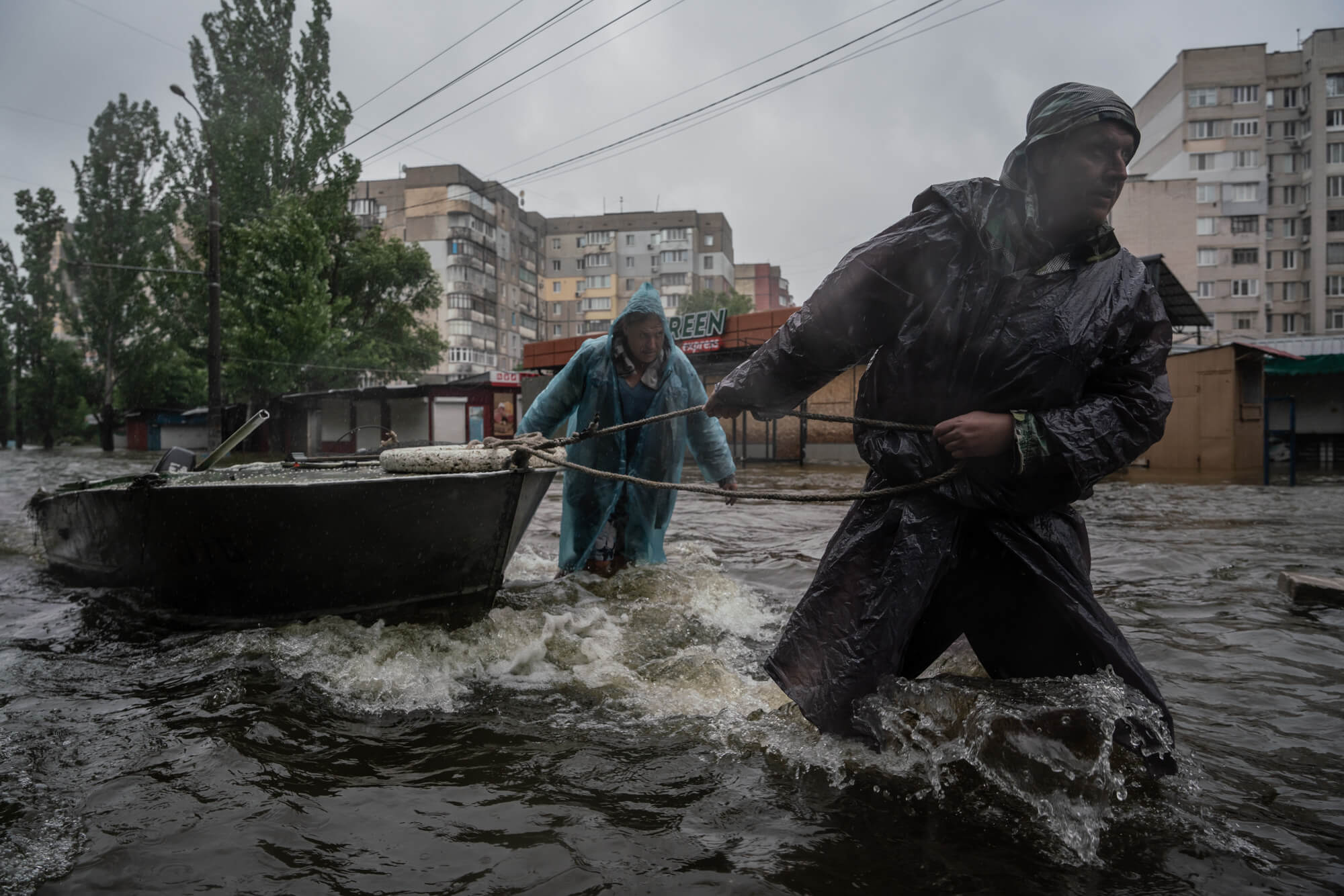
Inside the apartment, an assortment of bicycles, numerous cacti, and a dozen perfume bottles are stacked together.
78-year-old Clarinda Vasylivna rises from her bed and transfers herself into a wheelchair, her legs devoid of motion. She retrieves a large container filled with essential documents and three phones. Looking at one of her phones, she begins to recite a poem about the liberation of Kherson. She describes the alleged surrender of the city by collaborators and the atmosphere of fear that has engulfed people’s lives. She almost cries as she reaches the line envisioning a future when the flags flying above Kherson are blue and yellow.
Clarinda Vasylivna says that initially, she had contemplated staying in her flat. However, her children who are currently living in Portugal ultimately convinced her otherwise: if another shell hits the building, the situation will be completely hopeless. The flat will have to be repaired anyway, and given Clarinda’s age and condition, it would be too difficult.
The twins manage to extract the 100-kilogram woman from the third floor. Pausing briefly on the second floor, Clarinda bids a tearful farewell to her friend Larysa. Both women shed tears, uncertain if they will ever have the chance to see each other again. Through the tears Clarinda Vasylivna manages to whisper words of comfort: «Well, don’t cry, everything is fine, everything is fine».
Assisted by two more men, Yura and Borys carefully place the woman onto the boat. They secure her with ropes and raincoats.
The twins navigate the boat a few meters away from the house. Clarinda Vasylivna asks the twins to stop near a tree adorned with white blossoms:
«My dear catalpa… Goodbye», — she cries.
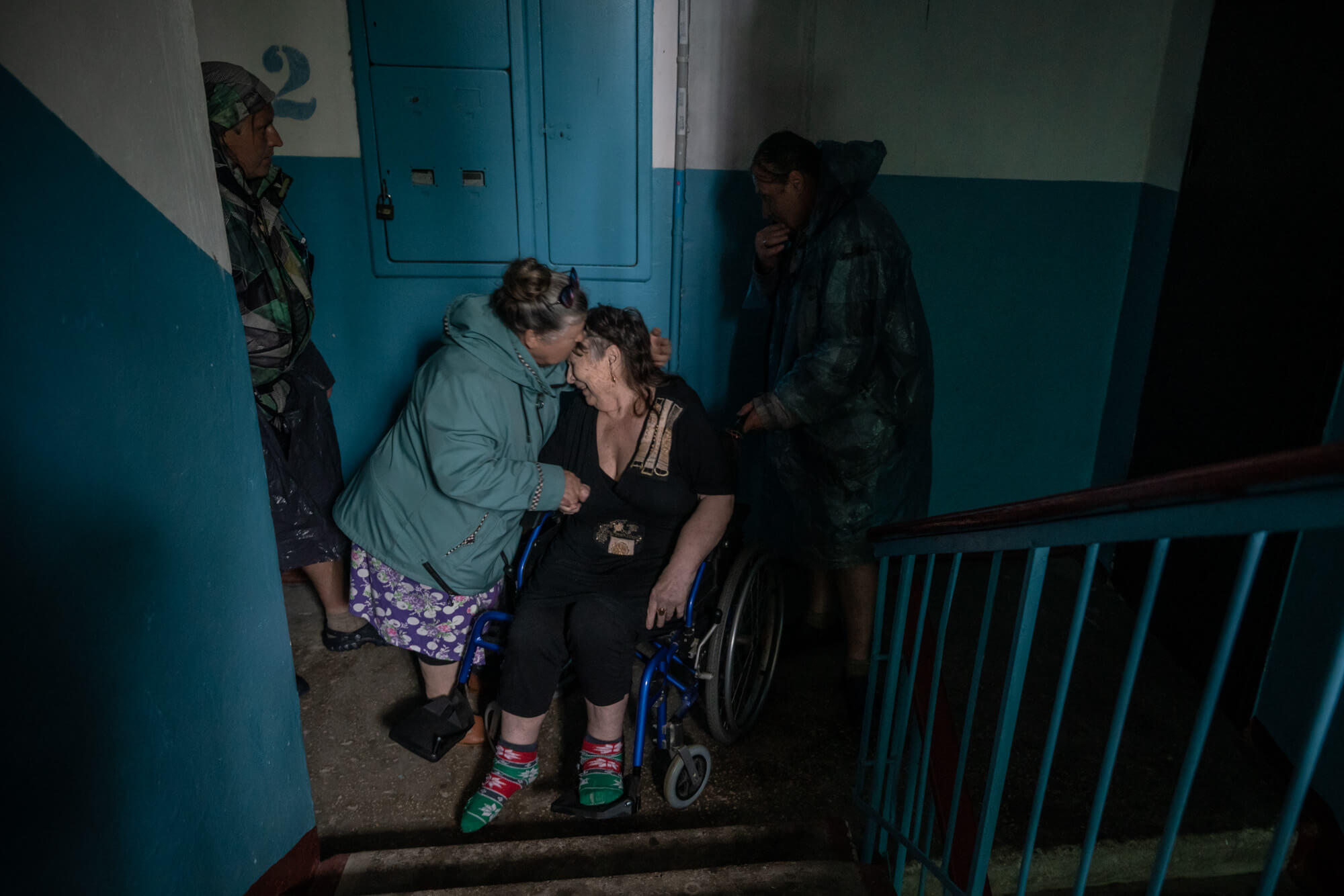
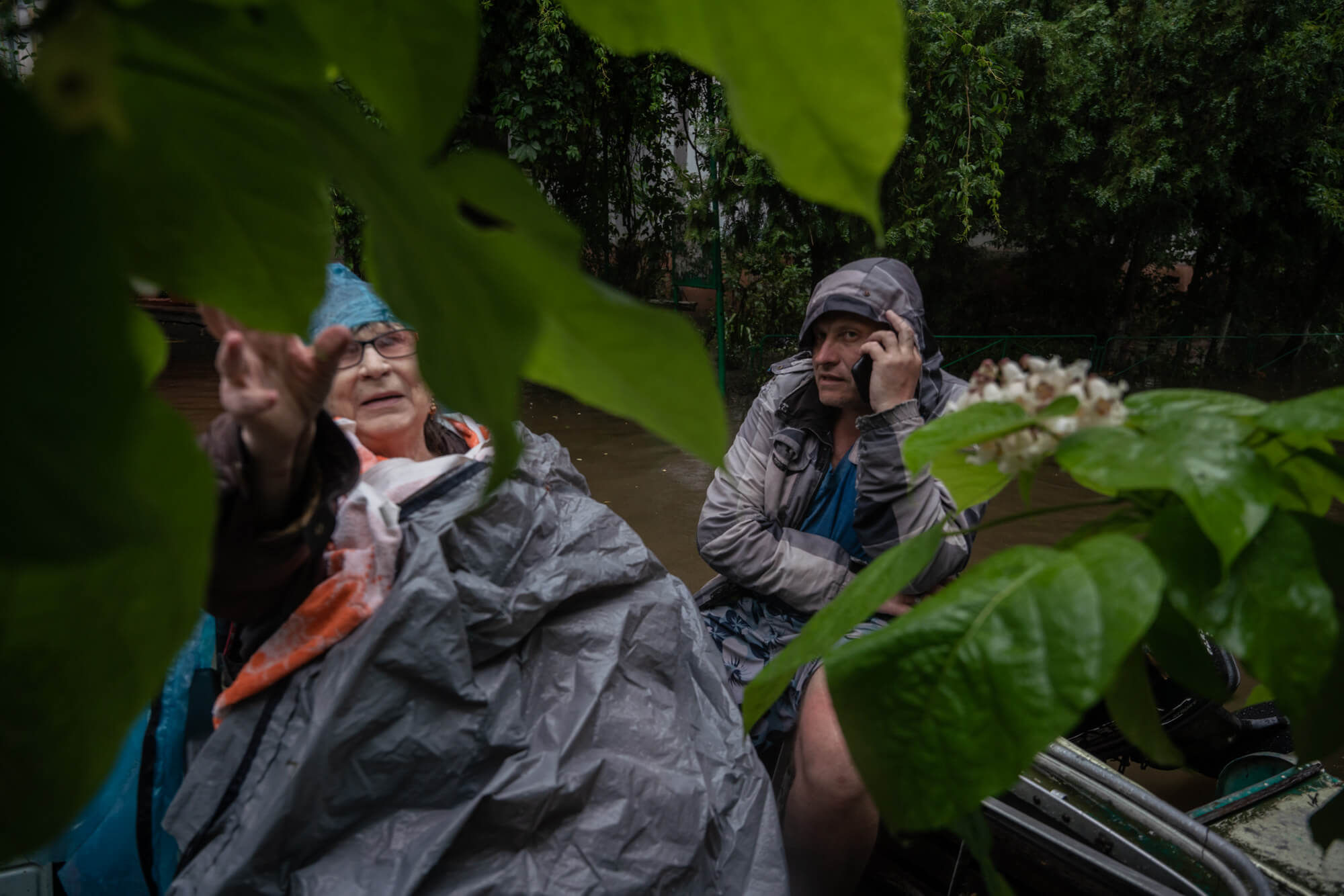
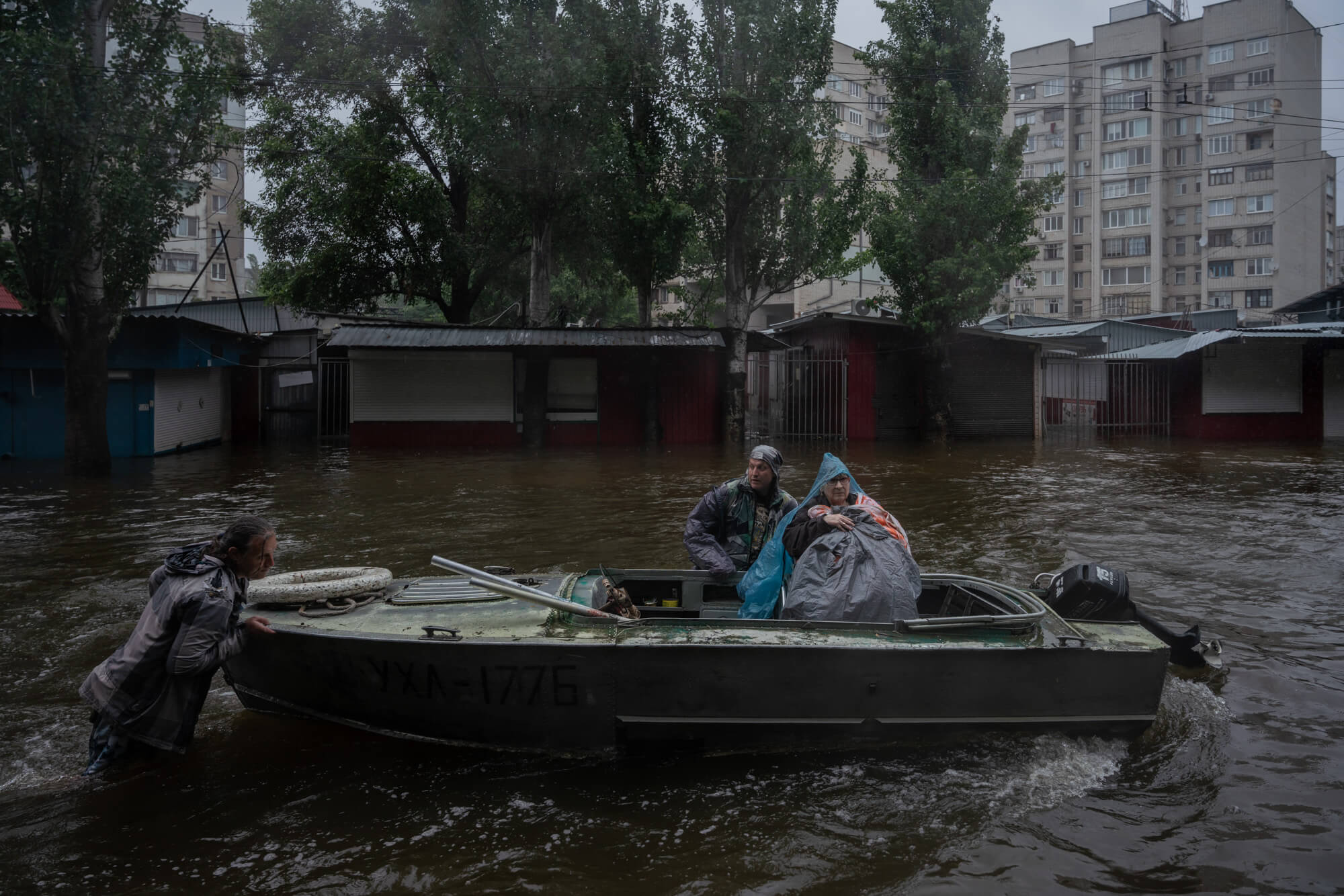
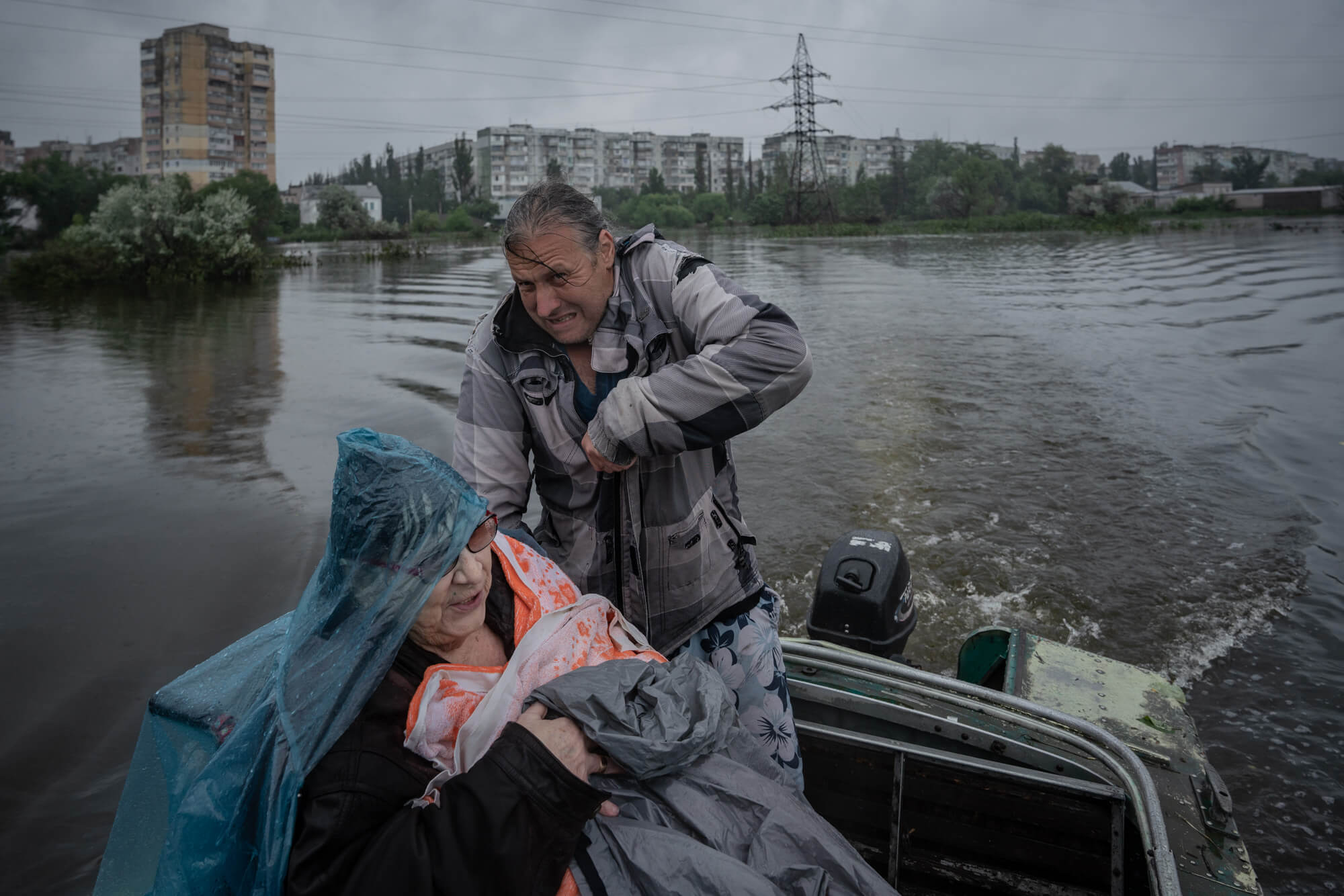
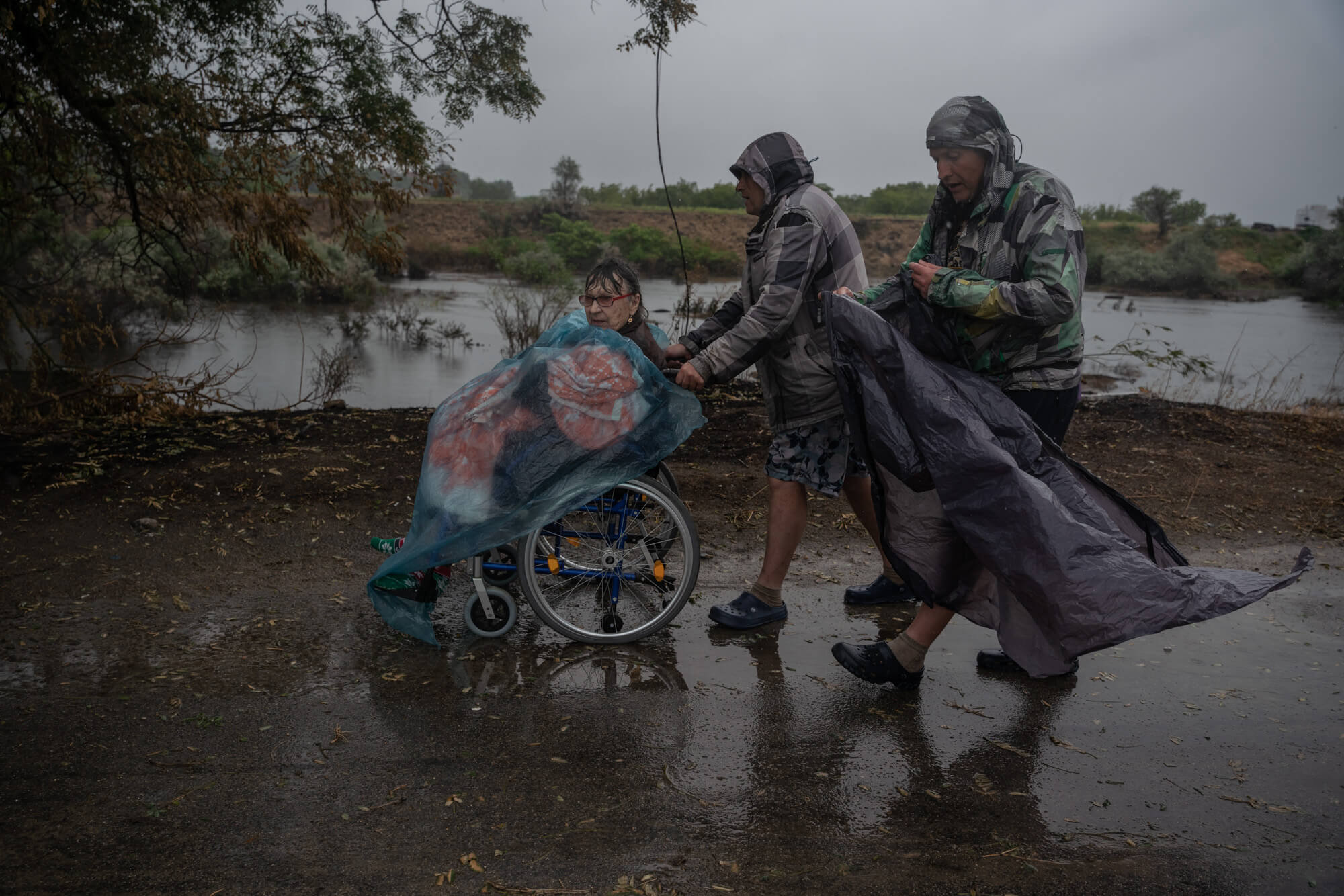
Clarinda Vasylivna gently touches the tree, a familiar sight she saw daily from her window.
As they sail through the streets of her hometown, she confesses that it has been a while since she last ventured outside her home.
— I can hardly recognize anything. I’ve forgotten how everything looks here. There used to be such beauty. Roses, grapevines, the nightingales’ songs filling the air…
It’s just the beginning
«I have no idea who this Karen is», — says Clarinda Vasilievna when she finds herself on the shore.
She had only learned about Karen’s existence yesterday through an online chat.
Here is his ambulance. Instead of food and cats, a sick woman is sitting inside. She was evacuated from one of the flooded villages.
Karen appears to be in high spirits. He shares stories of his previous rescue missions. He recounts how he had obtained an abandoned school bus from Snigurivka and made his way to Kherson for Easter last year. At various checkpoints, he was questioned by Russians: «Where are you from and where are you going?» To which Karen cleverly replied, «Fuck knows where from and fuck knows where to». Surprisingly, he was allowed to pass through safely.
As the rain begins to stop, the wind continues to whip the raincoats around. Volunteers are ready to take charge of Clarinda Vasylivna’s care.
Borys and Yura, stand together in the distance resembling two big birds. In a matter of moments, they will set off once again to rescue others in need.
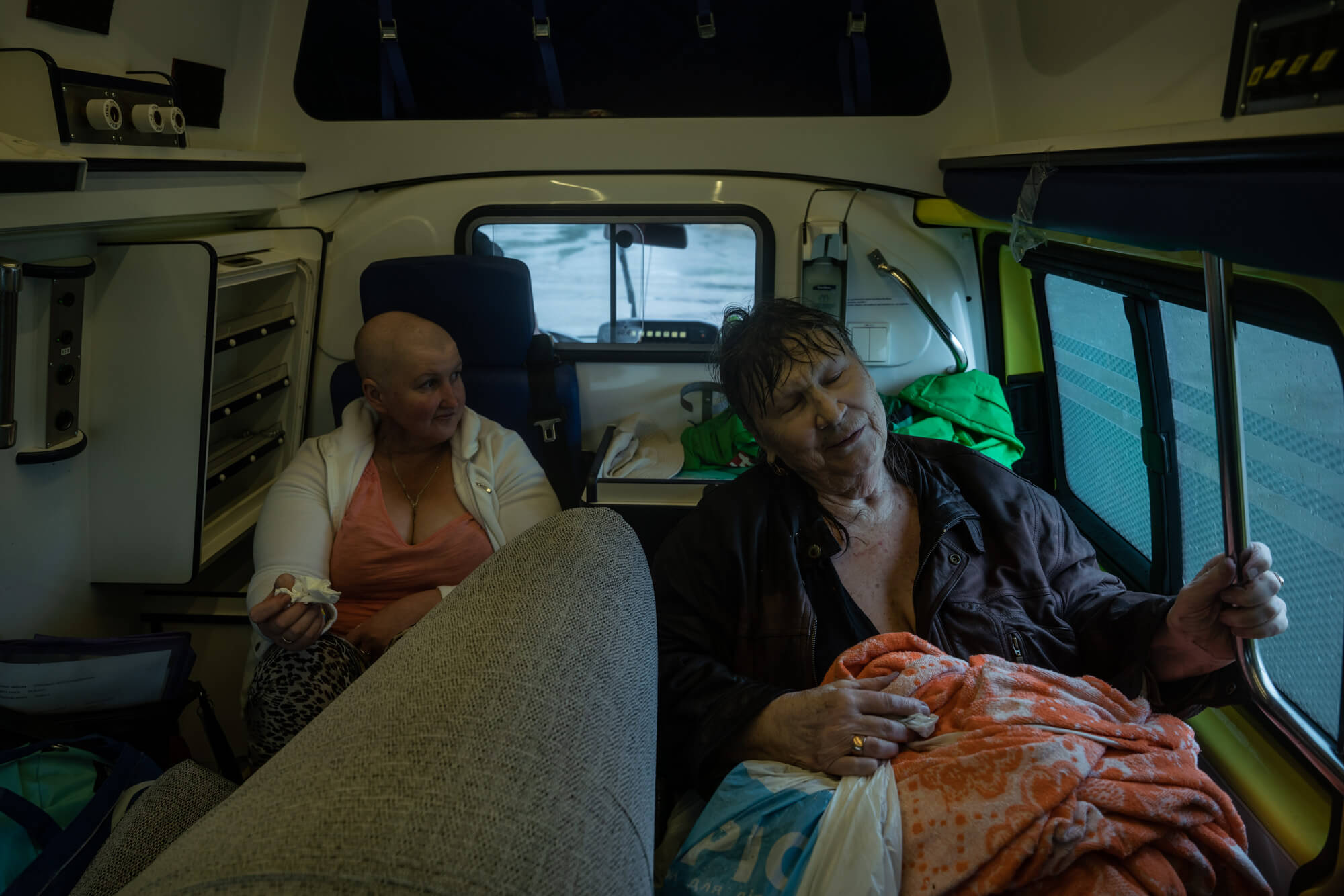
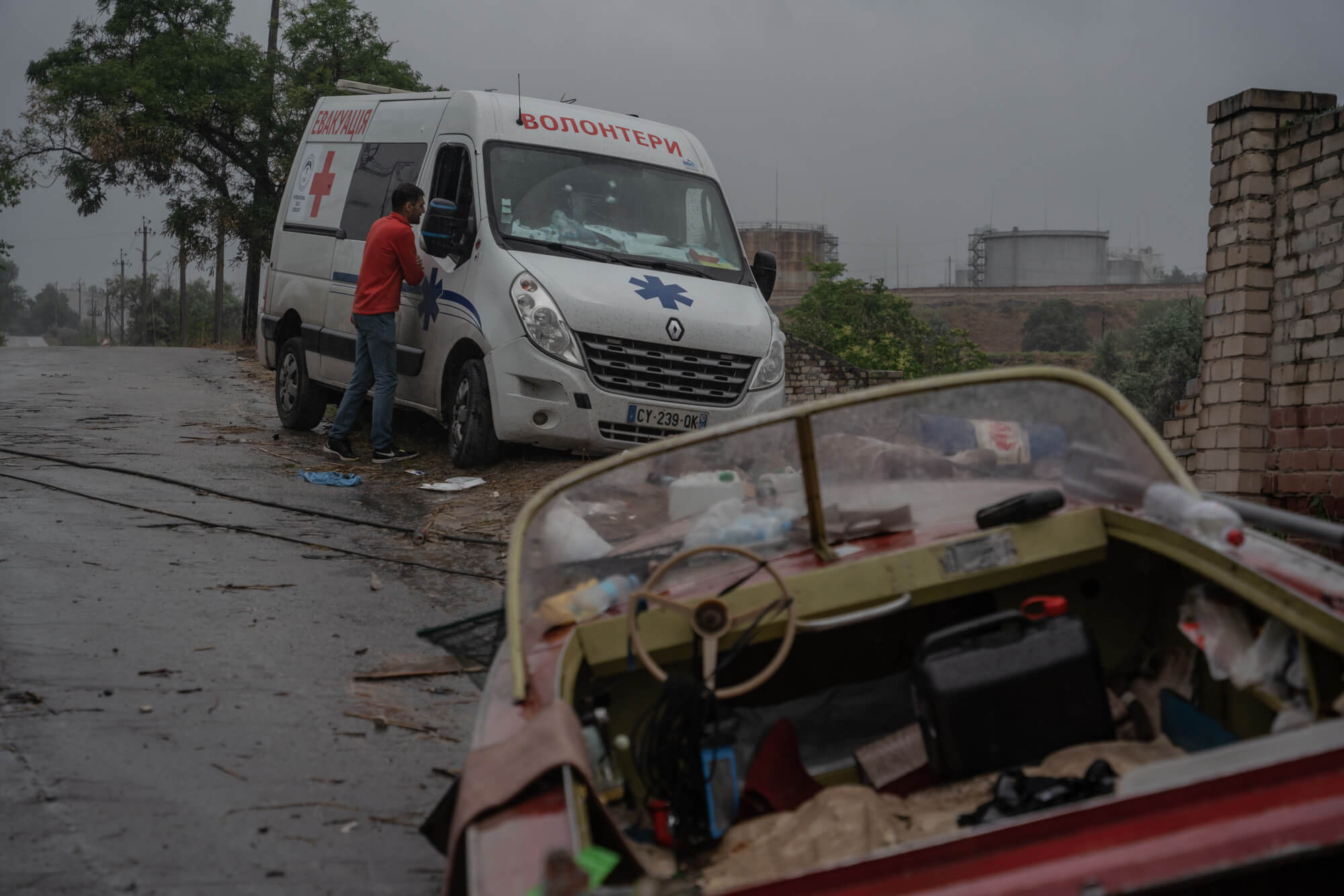
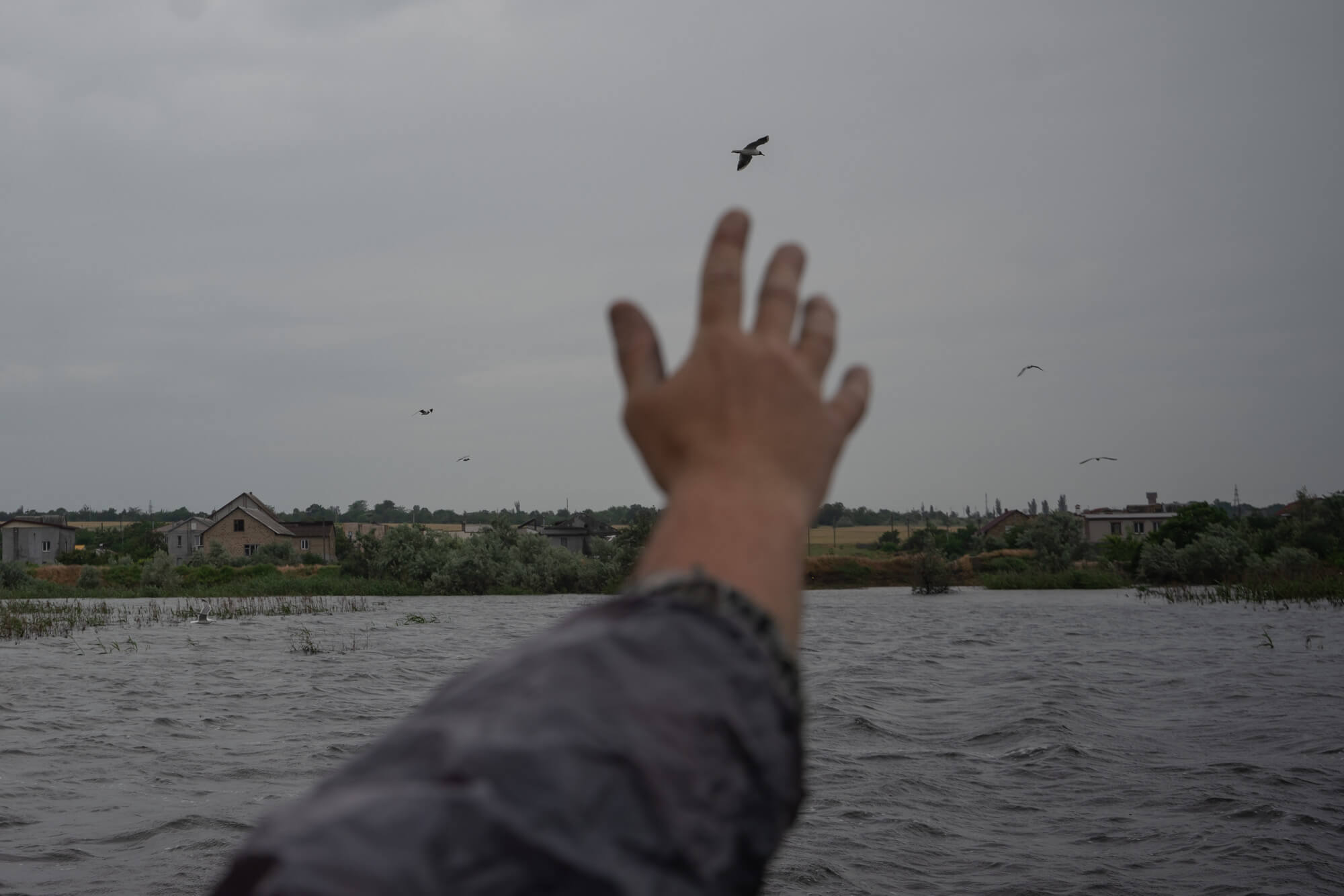
The twins stop at a gas station on the way out of Kherson. They see a familiar rescuer, who has been stationed at Ship Square, the largest evacuation point. He shares that just yesterday he rescued his former teacher, who had once considered expelling him from school. Shortly after, Artur arrives at the gas station, clad in a drenched white hotel robe after falling off a jet ski.
Artur, currently engaged in combat near Pisky in the Donetsk region, has been granted a five-day leave. During this time, he has taken on the responsibility of rescuing people in the Kherson region alongside three previously wounded comrades. Through his Instagram account, Artur managed to raise funds for two jet skis, which he uses to help those in need following the destruction caused by the Russians’ sabotage of the Kakhovka Dam.
Artur shows a photograph of enemy soldiers who met a watery fate. He then tells the story of how he rescued a kitten from a flooded house, its mother drowned.
Just as he finishes, one of his fellow soldiers approaches.
«He has a wound in his leg resembling female genitals». — Artur laughs. — «What else can he do when he walks around and talks like that? I told him to keep his legs covered, but he didn’t listen. And one day I heard: «Cargo 300 (wounded), a piece of shrapnel». Turns out, he was missing the ladies in the trench and ended up doing that to himself».
— You have to practice yoga to be able to do that!
— No, — the boy interjects, grabbing his heel and pulling it up forcefully, reaching. — Not necessarily.
The scene elicits laughter from everyone. Life goes on.
There is concern that a plague outbreak may occur in the city. There are even rumors of current cholera cases.
The rain eventually stops. But as it was pouring in the middle of the river two hours ago, Yuriy and Borys were gazing into the distance and solemnly repeated in unison:
— The islands will be washed away… Rivers will change their course… Millions of living creatures will perish…
Translated by Dariia Lytoshenko.
Have read to the end! What's next?
Next is a small request.
Building media in Ukraine is not an easy task. It requires special experience, knowledge and special resources. Literary reportage is also one of the most expensive genres of journalism. That's why we need your support.
We have no investors or "friendly politicians" - we’ve always been independent. The only dependence we would like to have is dependence on educated and caring readers. We invite you to support us on Patreon, so we could create more valuable things with your help.
Reports130
More






